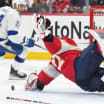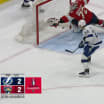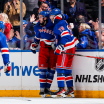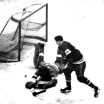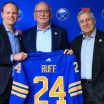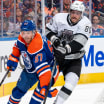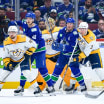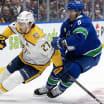The Washington Capitals have put their past Stanley Cup Playoff failures behind them, advancing to the Stanley Cup Final.
With their 4-0 win against the Tampa Bay Lightning in Game 7 of the Eastern Conference Final on Wednesday, the Capitals have reached the Cup Final for the second time (swept by the Detroit Red Wings in 1998). They have faced plenty of adversity through the years, specifically this postseason, but persevered past the Columbus Blue Jackets in six games, Pittsburgh Penguins in six and Lightning in seven.
How Capitals got to 2018 Stanley Cup Final
Play of Ovechkin, Kuznetsov, Holtby's road success helped Washington win Eastern Conference
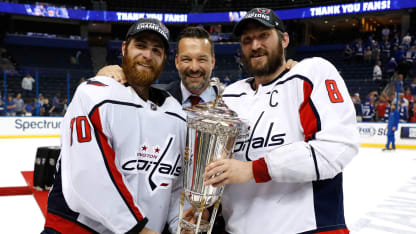
© Mike Carlson/Getty Images
Left wing Alex Ovechkin, who had never made it past the second round prior to this postseason, was instrumental in Washington winning three rounds, scoring 22 points (12 goals, 10 assists) in 19 playoff games. The Capitals, who have traditionally played Ovechkin and Nicklas Backstrom on the same line, made a full-time shift to Ovechkin playing with center Evgeny Kuznetsov this season, and it paid off. Kuznetsov leads the playoffs with 24 points (11 goals, 13 assists).
RELATED: [How Capitals were built |Complete Golden Knights vs. Capitals series coverage]
The Capitals made it to the Final despite missing Backstrom for four playoff games because of a hand injury and trailing in each series. Washington lost the first two games to Columbus at home in the first round before winning four straight. Then, after winning the first two games on the road against the Lightning in the conference final, the Capitals lost three straight before winning Games 6 and 7.
In between those series, the Capitals took down the back-to-back Stanley Cup champion Penguins, who eliminated them in each of the previous two second rounds. Washington's playoff disappointments over the years came although they had much regular-season success. Since Ovechkin entered the NHL in 2005-06, the Capitals have the fourth-most regular-season wins (564) and have won the Presidents' Trophy three times, most in the NHL.
The Capitals' patience with core players Ovechkin, Backstrom, Kuznetsov, Braden Holtby, John Carlson and coach Barry Trotz, who's in the final season of a four-year contract, has paid dividends during this deep run. Prior to Wednesday against Tampa Bay, Washington was 3-7 in Game 7 during the Ovechkin/Backstrom era.
Holtby had the worst regular season of his NHL career, leading to more playing time for backup Philipp Grubauer, who started Games 1 and 2 of the first round. But after the Capitals turned back to Holtby, their starter bounced back to go 12-5 in 17 postseason starts, including 8-2 on the road.
Here are some of the highlights along the Capitals' road to the Stanley Cup Final:
BEST MOMENT: Game 7 vs. Lightning, Eastern Conference Final -- With the Capitals' season on the line, they dominated from start to finish in a 4-0 road win against the Lightning. Ovechkin scored 1:02 into the first period, forward Andre Burakovsky scored his first two goals of the playoffs, and Holtby had his second straight shutout. Washington won its third road game of the series and after trailing 3-2 eliminated the Lightning and advance to the Cup Final.
TURNING POINT: Game 4 against Blue Jackets, first round -- After losing the first two games to the Blue Jackets at home and then winning Game 3 on the road in double overtime, their 4-1 win at Nationwide Arena evened the series at 2-2. Washington outshot Columbus, 33-24, and right wing Tom Wilson, who had a breakout season on the top line, scored two points (one goal, one assist) and was plus-3 with seven shots on goal and three hits. The line of Ovechkin, Kuznetsov and Wilson combined for eight points in this momentum-shifting win, and Washington went on to win Games 5 and 6, going 3-0 on the road in the first round.
BEST MOVE MADE: Trading for Michal Kempny -- An underrated move was acquiring
Kempny from the Chicago Blackhawks
on Feb. 19. Washington traded for the 27-year-old to improve their defensive depth and he ended up being a great fit on the top pair with Carlson late in the regular season and in the playoffs. Kempny opened the scoring with a goal in Game 1 of the conference final and is plus-1 with 32 shots on goal, 20 hits and 31 blocked shots in 17:38 per game this postseason.
BEST MOVE NOT MADE: Not shaking up core last offseason -- It's hard to believe there was
legitimate trade talk surrounding Ovechkin
last year. It may be shocking in hindsight, but Washington's patience with its core led to this breakthrough postseason. They let power-play defenseman Kevin Shattenkirk leave as a free agent, reaffirming trust in Carlson, who led NHL defensemen in regular-season scoring (68 points) and had 10 power-play points in the first two playoff rounds. Instead of making impulse moves to bring in fresh faces, the Capitals gave Kuznetsov and T.J. Oshie each an eight-year contract, and they came up big in the postseason.
SIGNATURE WIN (REGULAR SEASON): March 12 vs. Winnipeg Jets -- This game will be remembered for Ovechkin scoring his 600th NHL goal, but it came against the Jets, who finished with the second-most points (114) in the NHL and reached the conference final. Ovechkin, who led the NHL in regular-season goals (49), scored Washington's first two goals to reach the milestone. But then Jets right wing Patrik Laine, who finished second to Ovechkin in goals (44), scored to tie the game at 5:02 in the third period. Kuznetsov scored in overtime to give the Capitals a 3-2 home win against one of the NHL's best teams. This was the second game of a stretch when Washington won 12 of its final 15 games to build momentum for the playoffs.
SIGNATURE WIN (PLAYOFFS) Game 6 against Penguins, second round --Washington finally exorcised its playoff demons against Pittsburgh with a 2-1 overtime win on the road. It was the Capitals' first playoff series win against the Penguins since 1994; they had lost seven straight against them, three in the Ovechkin era. Despite being without Backstrom (hand), Wilson (suspension) and Burakovsky (upper body), Washington clinched the series on an overtime goal from Kuznetsov, assisted by Ovechkin.
MVP: Alex Ovechkin -- The elite forward was criticized last offseason and throughout the years in the playoffs but delivered all season long for the Capitals. At 32, Ovechkin had his highest regular-season point total (87) since 2009-10 (109). In the playoffs, he had improved shot selection (15.0 percent; 12 goals on 80 SOG) compared to the previous five postseasons and made some key defensive and unselfish plays in big moments. He also had his highest power-play point total (nine) in a single postseason. The generational player is four wins from his first Stanley Cup.
ROOKIE OF YEAR: Jakub Vrana -- The Capitals tapped into their pipeline for Vrana, who played 21 games last season but spent most of the year with Hershey of the American Hockey League (49 games). After the departure of right wing Justin Williams as a free agent this offseason and the trade of forward Marcus Johansson to the New Jersey Devils on July 2, the Capitals rookie bounced around the lineup in the regular season and had 27 points (13 goals, 14 assists) in 73 games. He latched onto the second line with Backstrom and Oshie in the playoffs and made key contributions. Most notably, Vrana's three points (one goal, two assists), two coming in a third-period stint on the top line with Ovechkin and Kuznetsov, sparked the Capitals' comeback in Game 5 against the Penguins in the second round.
BIGGEST SURPRISE: Lars Eller -- Washington's secondary scorers have stepped up this postseason, with 14 players having at least five points. But no role player made a bigger difference than Eller, who was their third-line center for most of the season. His 13 points (five goals, eight assists) in 19 playoff games rank sixth on the team, and his two game-winning goals are tied with Vrana and Oshie for their lead. Eller was especially reliable during Backstrom's absence; he had four points (two goals, two assists), two power-play points, nine SOG and won 52.4 percent of his face-offs over the four games.




